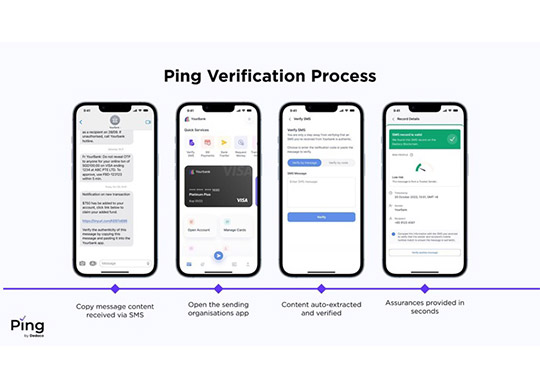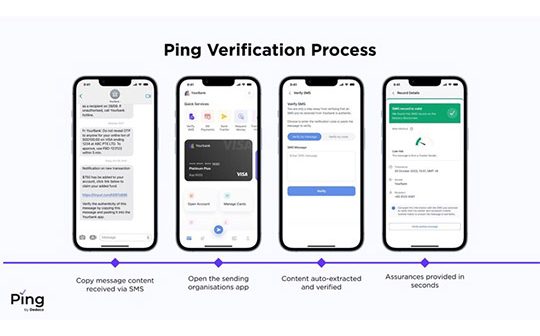
Dedoco has announced the official launch of its anti-scam verification platform, Ping.
Ping tackles the prevalent threat of digital fraud through impersonation scams by making omni-channel communication between organisations and their customers verifiable in real-time. The technology provides a simple, actionable step for recipients to verify the authenticity of a message received via SMS, messaging apps such as WhatsApp, Line and Viber, or over email.
Daphne Ng, Founder and CEO of Dedoco said, “With our B2B2C model, Ping does more than just validate legitimate content. We help brands and businesses stay ahead of sophisticated tactics by placing guardrails across all channels facing attack. And with Singapore being the epitome of digital trust and security, we are proud to be a homegrown platform solving an important gap in last mile, self-serve verification; and to play a part in contributing to our crime prevention”.
To date, organisations have remained powerless against digital communications impersonation scams that target their customers, resulting in tremendous reputational damage, financial losses, and an irreparable loss of trust. With Ping, the Company believes it has an effective solution that seamlessly safeguards business communications by putting privacy and security at the forefront of all interactions, while providing needed assurance and support to recipients of these communications.
Customers like MSIG Singapore are deploying Ping both within their own communication channels, and taking a step further by offering Ping through its cyber insurance protection in conjunction with its intermediary partner, Embed Global.
“As cyber risks continue to be on the rise in a connected world, our industry needs to accelerate in embracing new technologies to curb the issue. Individuals and SMEs with fewer internal controls are more likely to be targeted by cyber criminals, and these attacks can lead to financial losses, reputational damage and even legal repercussions for them. A robust anti-scam verification solution will make it increasingly difficult for criminals to penetrate and will provide our customers and SME clients the assurance of a secured digital experience,” said Mack Eng, CEO of MSIG Singapore.
Outside of Singapore, the Company has already managed to secure interest from a diverse cohort of organisations across the region’s most targeted industries. First deployment in Indonesia will be rolled out as early as Q1 2024.
A timely and effective solution for the growing scam epidemic
According to the Singapore Police Force, scam cases in Singapore increased by 64.5 percent in the first half of 2023, compared to the same period in the previous year. To address this mounting issue, the Monetary Authority of Singapore and Infocomm Media Development Authority of Singapore have announced their intention to put in place the Shared Responsibility Framework that holds negligent financial institutions and telcos accountable for consumer losses owing to certain phishing scams.
While the exact scope and definition of phishing scams in the framework are still being established, the authorities have highlighted that negligent organisations that breach their duty to protect consumers under the framework will be required to distribute payouts to affected scam victims. With more than S$334.6 million lost in Singapore to scammers in just the first six months of 2023, financial institutions and telcos may find themselves faced with significant financial and reputational losses should they fail to secure communications with their customers. Beyond Singapore, digital scams are a global problem, with a total of S$1.4 trillion lost between August 2022 and 2023. 3
Espousing Zero Trust to rebuild online assurance
Directly addressing the growing concern with unverifiable messaging reaching our devices, Ping operates on the principle of Zero Trust to protect users from carefully disguised and socially engineered online scams. Available over the Ping app or integrated into an organisation’s native application for a seamless and fuss-free user experience, Ping provides scaled verification to tactically secure the most common channels for business-consumer communications, SMS, instant messaging platforms, and email.
The solution works by ensuring only communications from pre-registered businesses can be verified by recipients, filtering out impersonation attempts by scammers. Upon registration, all outgoing communication is registered on Dedoco’s tamperproof Trust Engine, enabling customers to perform a simple authenticity check through the organisation’s mobile app or website. Customers will then be informed in seconds if the message is authentic, whilst messages that are verified as invalid will become part of organisations proactive fraud prevention strategy.
To keep ahead of evolving threats, Ping’s AI and machine learning-powered engine runs continuous behavioural analytics to provide organisations and law enforcement the alerts and insights that are critical to impactful counter-fraud measures. Through the surfacing of malicious messages and their content in real-time Ping aims to fast-track the blocking of vulnerable accounts and the reporting of nefarious links to the authorities for takedown.
Image: An illustration of the verification process, shown above with the example of a financial institution.





